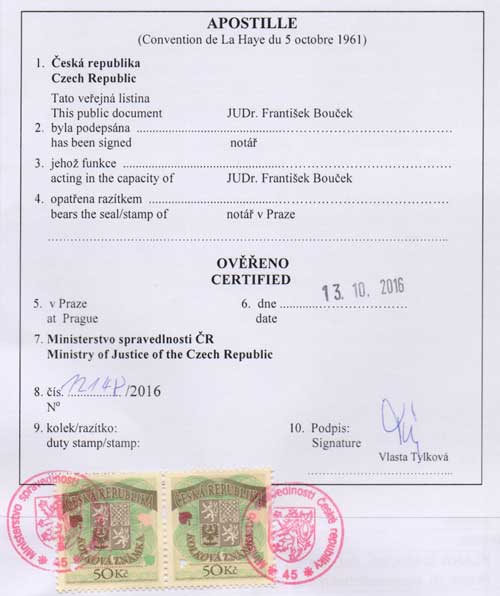
Schmidt & Schmidt covers the full spectrum of legalization services for documents issued in the Czech Republic.
The Czech Republic joined the Hague Convention on the Simplified Authentication of Documents on 23 June 1998; the Convention entered into force on 16 March 1999.
The apostille, or the “Hague apostille” is a certificate that authenticates the origin of a public document (e.g., a birth, marriage or death certificate, a judgment, an extract of a register or a notarial attestation). It confirms the authenticity of the signature and the authority of an official who signed the public document.
Documents issued in the Czech Republic are certified with an apostille in accordance with the Hague Convention of 1961 are recognized in all Member States of the Hague Convention and do not require any other form of certification, such as consular legalization, which considerably reduces the costs and time required for the certification of documents. So far, more than 120 states have joined the Convention.
The apostille is not sufficient for use in the states that are not party to the Hague Convention. In this case, consular legalization applies to a public document.
Designated Competent Apostille Authorities in the Czech Republic
In the Czech Republic, there are a few designated competent authorities from where you can obtain an apostille for your official documents. They are:
- The Ministry of Justice: this authority handles judicial documents, including those issued or certified by notaries.
- The Ministry of Foreign Affairs: this authority deals with documents other than judicial ones.
The apostille fee is approximately 100 CZK, which is around 4 EU. You can obtain an apostille for Czech documents either from the Ministry of Foreign Affairs or the Ministry of Justice, depending on the specific type of document.
It's important to be aware of which representative is responsible for the acknowledgment of signatures and issuance of apostilles, as the process can get quite complex. Please check for the relevant information on the Czech government website (in Czech) or consult competent service providers.
The apostille in the Czech Republic is a square stamp in Czech and English with the obligatory heading "Apostille" and a reference to the 1961 Hague Convention in French (Convention de La Haye du 5 octobre 1961). The apostille certificate’s sides will be at least 9 centimeters long.
Types of documents

| Can be apostillized | Cannot be apostillized |
|---|---|
|
|
Specific aspects and document requirements for the apostille in the Czech Republic
To secure an apostille for your documents in the Czech Republic, it's crucial to ensure that your documents fulfill the required criteria. The following prerequisites may be applicable:
- The original hard copy of the document you intend to have legalized, or a copy thereof.
- A completed Order Form (available in PDF or Word format).
- Proof of online payment.
- A prepaid return envelope, if you prefer not to collect the documents in person or opt for our shipping service.
When seeking an apostille for a document in the Czech Republic, the following conditions will usually need to be met:
- The document should bear the original stamp of the issuing authority, with the authority's name clearly visible.
- The document must include the signature and printed name of the individual who applied for the stamp.
- The position or official title of the person who stamped the document should also be indicated.
Keep in mind that obtaining an apostille may take considerable time, so it's advisable to prepare well in advance if you need to legalize documents with an apostille for use in a foreign country.
The apostille is issued in a uniform format. In the Czech Republic, it has the form of a printed sticker with a handwritten signature of an official, an official seal, and a hologram.
In cases where apostilles are not recognized, holders of foreign documents will need to legalize them instead. However, If the country of destination of the document recognizes and issues apostilles, then legalization is unnecessary.
Legalization of Czech educational documents for use abroad
For educational documents issued in the Czech Republic, such as school reports, university degree certificates, transcripts of records, enrollment certificates, and other school or university certificates, to be recognized and valid abroad, they must undergo a certification process through legalization.
Different types of transcripts or certificates have specific guidelines for legalization. To obtain a Czech certification for your diploma to be used abroad, you must follow a specific process. Here's a step-by-step guide:
- Diploma Legalization at the Czech Ministry of Education: Begin by legalizing your diploma at the Czech Ministry of Education. This involves obtaining a stamp that certifies the authenticity of your diploma.
- Legalization Office at the Ministry of Foreign Affairs: After your diploma has been legalized at the Ministry of Education, proceed to the Legalization Office at the Czech Ministry of Foreign Affairs. This office will issue the Apostille for your diploma.
Furthermore, there are additional considerations for certain cases. Currently, the Ministry of the Interior (MOI) may require a nostrification of education (for high school or vocational education) or recognition of university education in specific instances. This requirement is particularly applicable when there is reasonable doubt regarding whether your education meets the necessary criteria for the nature of employment. This applies to applications for an Employee Card or a Blue Card.
Please note that the above information and process might be subject to change based on prevailing regulations and policies.
Recognition of the authenticity of public documents within the EU
Documents from countries with which Czech Republic has bilateral agreements for exemption from legalization are not required to undergo any form of legalization procedures. Some of the countries include (the abolishment depends on the types of documents):
- Afghanistan, Albania, Algeria, Austria, Belarus, Belgium, Bosnia and Hercegovina, Bulgaria, Croatia, Cuba, Czech Republic, France, Georgia, Greece, Hungary, Italy - exemption only for documents related to mutual legal (judicial) assistance under the Treaty.
- Korea, Democratic People's Republic of Korea (North Korea), Kosovo, Kyrgyzstan, Macedonia, Moldavia, Mongolia, Montenegro, Poland - exemption for certain documents.
- Portugal, Romania, Russian Federation, Serbia, Slovakia, Slovenia, Spain, Syria, Switzerland, Ukraine, Uzbekistan, Yemen - suspension of the operation of the Treaty from the 11th April 2019.
Regulation on public documents (EU) 2016/1191 of 6 July 2016
Furthermore, Regulation (EU) 2016/1191 of 6 July 2016 on public documents simplifies the circulation of certain public documents that must be presented in an EU Member State and have been issued in another EU Member State, thus exempting public documents from the confirmation of authenticity with the Apostille with the aim of reducing administrative burden and costs for citizens.
Consular legalization of Czech documents for use abroad
Consular legalization is the process of authenticating or certifying a legal document so a foreign country's legal system will recognize it as with full legal effect that is carried out by the diplomatic or consular mission of the country in which the document is to be used.
Consular legalization is more complex, time-consuming and costly than the simpler apostille procedure. Whereas apostille is usually issued within one step, consular legalization requires several pre-certifications before a public document can be certified at the embassy or consulate of the destination country in the Czech Republic.
It is a common requirement that the document has to be translated into the official language of the destination country before submission to the embassy. It is up to the diplomatic mission to decide about the authentication procedure.
The main differences between an apostille and consular legalization of documents
The common feature between apostille and consular legalization is that they authenticate an official document for presentation to institutions in another country. However, they have many differences.
| Apostille | Consular legalization | |
|---|---|---|
| Legal effect | Can be used in all countries that are party to the Hague Convention on the Simplified Legalization of Documents. | Use between States one or both of which is not a member of the Hague Convention, or where one of the contracting States has protested the accession of the other. |
| Difficulty | Moderate. To obtain an apostille, contact the competent apostille authority of the state of origin of the document. | High. For consular legalization, various inland authorities and a diplomatic mission of the state of destination must be involved. |
| Pre-certification | Usually not required. | Is obligatory. |
| Attestation at the state of destination embassy in the state of origin of the document | No need to contact the Consulate of the country of destination. | Is the final step of legalization. |
Apostille and consular legalization in all cities of the Czech Republic
Schmidt & Schmidt provides apostille and consular legalization services for public documents originating from all regions across the Czech Republic. We handle the entire process, from document review to obtaining the necessary certifications, ensuring that your documents are valid and recognized internationally. With our reliable services, you can confidently use your Czech Republican public documents abroad.
Procurement of documents from the Czech Republic
If the important documents are lost or damaged, or current copies of the documents are needed, the re-issue of the documents is required. It is not unusual for people outside the Czech Republic to encounter difficulties with obtaining new documents when abroad. Our consultants will help you procure new documents from the Czech Republic remotely, and we can arrange for your documents to be sent by courier anywhere in the world.
Certified translation of documents from the Czech Republic
Copies and transcripts of civil status documents can be translated into any language by a sworn translator in the Czech Republic or the translation can be done in the country of destination. We offer certified translations of civil status documents with further certification. The cost of the work is calculated according to the volume of the document in question.
Does the translation have to be apostillized?
Any foreign document issued in one country and used in another country must be legalized for use abroad. Therefore, the authenticity of a certified translation from the Czech Republic needs to be certified by an apostille. Consequently, many authorities may not accept certified translations from the Czech Republic if the translation has not been properly authenticated in the Czech Republic for use abroad. To avoid this confusion, translations should better be made in the state of the destination of the document.

























































